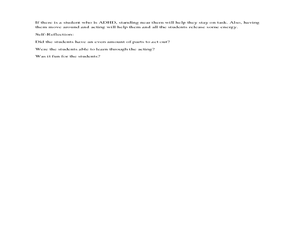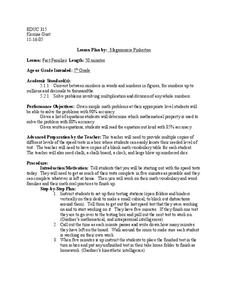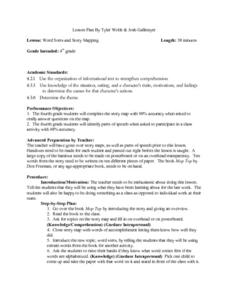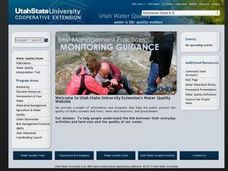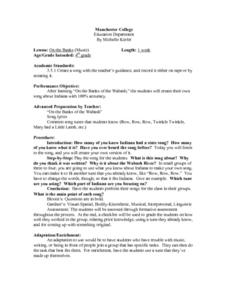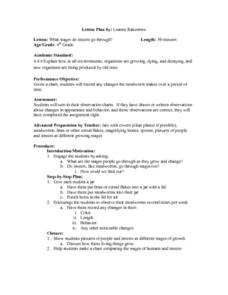Curated OER
How the Environment Affects Our Health
Ninth graders explore how the environment affects health. In this infectious disease lesson, 9th graders investigate what environmental situations cause infections diseases. Students study the symptoms, treatments, prevention, and...
Curated OER
Hitler's Fatal Gamble
Students consider the differences between totalitarianism and democracy. In this comparative politics instructional activity, students will read a handout describing the major components that comprise totalitarianism and democracy,...
Curated OER
Identifying the Beat
Sixth graders listen to various songs. In this musical properties lesson, 6th graders work in groups to identify musical selections, practice tapping the beat, review time signatures, and identify the meter of different songs.
Curated OER
The Beginnings of Constitutional Government
Students examine excerpts of Thomas Paine's Common Sense. In this early American history lesson plan, students read Paine's pamphlet and analyze the information according the rubric provided.
Curated OER
Introduction to the Cold War
Students examine the domino theory. In this cold war lesson, students watch a video about dominos and then get into groups that represent different nations. Students will then act out a mock simulation of the containment and domino theory.
Curated OER
Predator vs. Prey
Fifth graders participate in a game to become familiar with predators and preys. In this predator vs. prey lesson, 5th graders ascertain whether a photo shows an organism as a predator or a prey. Students read Killer Creatures. Students...
Curated OER
Making Sense of the Reformation in 1 Day
Ninth graders explore the events of the Protestant Reformation. in this religious denominations lesson, 9th graders use the provided graphic organizer to take notes on a PowerPoint presentation about the different beliefs withing...
Curated OER
Railroad Idioms Art Lesson Plan
Sixth graders research railroad idioms. In this idiom lesson, 6th graders read through a glossary of different railroad idioms and their meanings. They illustrate a chosen idiom.
Curated OER
Memories to Last: Observing Monuments
Students use scientific observation and inference to examine the Hazen Brigade Monument. In this observation lesson, students review the reasons for building monuments in society. Students then recall monuments they have seen and draw...
Curated OER
Butterfly Camouflage
Fifth graders discuss camouflage and warnings by butterflies as a class. Students design and color their own butterflies that they are to place somewhere in the classroom. Students explain why their butterfly is colored the way that it...
Curated OER
MAPPING A RESEARCH SITE AND COLLECTING AND PRESENTING POPULATION DATA
Sixth graders are to answer research questions based on data they collect.
Curated OER
Field Research Project: Comparing the Parent Rock Material of the San Francisco Terranes With Local Soil Types
Students investigate rocks and minerals and take a field trip to sample soils. They analyze rocks and soil, research the geological terrenes of the topology of San Francisco, and produce a lab research report.
Curated OER
Fact Families
Fifth graders explore fact families. They solve simple math problems. Students determine which mathematical property is used to solve the given problem. They are given five minutes to complete as many mathematical facts as possible.
Curated OER
Word Sorts And Story Mapping
Fourth graders engage in a lesson that covers the concept of using a storymap to increase reading comprehension. They possess the prior knowledge of parts of speech from previous lessons. Students fill in the blank storymap while working...
Curated OER
Earth
Fourth graders engage in a study of the solar system. The teacher constructs an outside model of it. They walk through it making constructive observations. Students conduct a class discussion about the solar system and planets. They...
Curated OER
Soil Science Study
Students complete an activity by looking and gathering data on plants and soils.
Curated OER
That Is Predictable
Students investigate the changes that can take place in an aquatic environment. They conduct research using a variety of resources. The research is used to report different possibilities of change because of abiotic or biotic factors.
Curated OER
American Folktales
Fourth graders read and interpret an American Folktale. Students create their own folktale about Indiana. Students use digital cameras and clipart from the computer to create a photo story. Students present their animated folktales to...
Curated OER
Following the North Star
Students give examples of the impacts of science and technology on the migration and settlement patterns of various groups. They draw stars
explaining how the North Star was used to give directions on the Underground Railroad.
Curated OER
On The Banks
Fourth graders write and perform an original song about Indiana. After learning the lyrics of the song "On the Banks of the Wabash," students write lyrics to their own song about Indiana with assistance from the instructor. They...
Curated OER
Reading Quilt/Main Idea
Sixth graders study main events in a story. In this reading comprehension lesson, 6th graders illustrate each event on a piece of paper with a quotation from the book and a summary of the event to represent the caption of the picture....
Curated OER
Revolutionary Newspaper
Fifth graders write a newspaper article about an important event or cause of the Revolutionary War. In small groups they participate in a jigsaw activity, and return to their original group to report on their new information. Students...
Curated OER
What Stages Do Insects Go Through?
Fourth graders observe mealworms over a period of time and record any changes they observe. They record any changes in color, length, behavior, and any other noticeable changes, identify the stages of the mealworms, and create a chart...
Curated OER
Civil War in Indiana
Fourth graders investigate events that occurred in Indiana during the US Civil War. They brainstorm how Indiana was involved in the Civil War before working in small groups to conduct research on one specific event. They take roles in...






